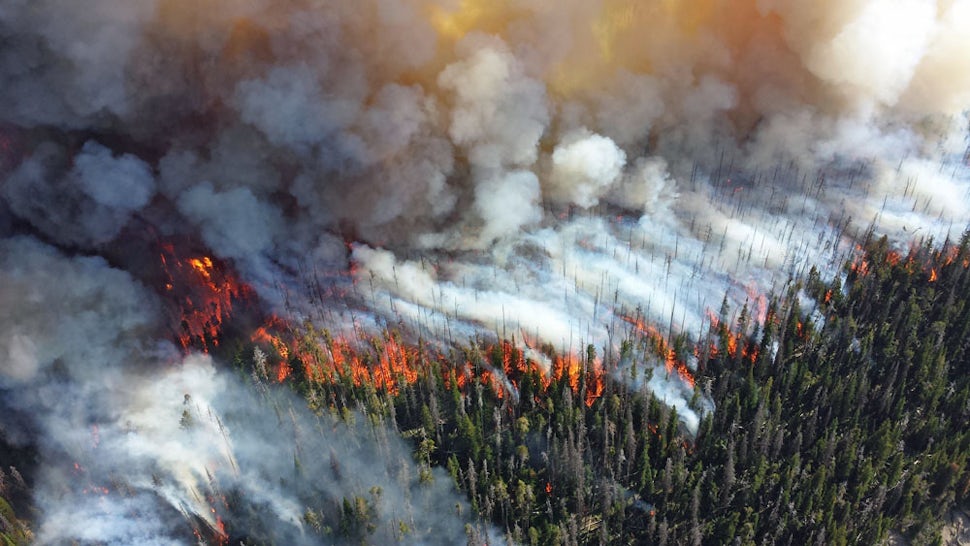Gone in a Blaze
Wildfires are all over our Facebook feed, our new channels and are a big conversation topic at the moment. But how much do you know about wildfires? Do you know how they start or how to prevent them?

*Image property of National Geographic Web
In 2015, over 2 million acres were burned due to human-caused wildfires. The number of wildfires was 58,916. As of November 30th of this year, there have been exactly 60,146 fires that have destroyed 5,270,323 acres of land. Over 3,700 firefighters spent their Thanksgiving Day fighting these fires. Twenty, large fires are currently burning in six different states and various parts of the Gatlinburg/Pigeon Forge area are under mandatory evacuation as of November 28th.
In one year, we have more than doubled our damage. These disasters were caused by the lack of knowledge on wildfires and the lack of respect for this earth we are blessed with. Before we know it, it will all be destroyed. Though prescribed fires can help bring back the ecosystem and health of nature, a wildfire is a force of nature that demands attention. It can be prevented by knowing what causes them, how to safely start and extinguish a fire, and sharing your knowledge with others.
Fire Basics:
A fire is a combination of heat, fuel, and oxygen. A heat source is something that ignites the fire such as a spark or ember. The fuel is a type of combustible material and can burn more easily depending on the amount of moisture in the material. Examples of this would be overgrowth, fallen trees or leaves. Oxygen is the key opponent that builds a fire. It only takes 16% of oxygen to start a fire and air contains 21%. When the wind speeds are higher, it fuels the fire more quickly and creates a hazardous atmosphere.
The Cause of Wildfires:
Wildfires can start at the camp site, on the roadside or in your own backyard. They can be a result of unattended campfires or improperly set-up camp site, burning of debris, or even carelessly tossing a cigarette butt from your vehicle. Nature itself can be a cause of a wildfire. Overgrowth, fallen trees, and leaves can be natural 'fuel' that can turn a small spark into a massive problem. The time of year and weather conditions are also influences that can increase the chance of wildfires. For instance, in lower humidity, the grounds become drier and are more likely to catch fire, as well as higher wind speeds and higher temperatures. During a drought, most areas will call for a fire ban which includes the stop of any open fires such as campfires or controlled burns, and even the stop of any fireworks.
What You Can Do:
The best way to prevent wildfire is to practice safety tips.
⦁ Always check your area or campsite for fire restrictions. Restrictions are typically posted on your county's website or at a trail head.
⦁ When building a campfire or setting up a portable stove, choose an area at least 15 feet away from your tent, any shrubs, low-bearing limbs, and trees. Always keep the fire small and under control and make sure to have water nearby the extinguish to fire or embers that escape.
⦁ Never leave your fire unattended.
⦁ When extinguishing your fire, pour water on all of the embers until the hissing sound stops. If you do not have water, bury the fire in dirt or sand.
⦁ If burning debris, make sure a permit is not required before burning. If so, obtain a permit.
⦁ When burning debris, be sure to stay at least 30 feet away from any structure. Keep a shovel around as well as keeping the surrounding 10 feet moistened with water to prevent it spreading. Extinguish fire the same as you would a campfire.
In the words of Smokey Bear, "Only you can prevent wildfires." Help us preserve and protect out lands by practicing what you have learned and sharing your knowledge with others. Take the pledge on the Smokey Bear website here and encourage others to do the same. Share this article. Help put an end to this vicious cycle. It truly is up to us to prevent wildfires. What will you do?
We want to acknowledge and thank the past, present, and future generations of all Native Nations and Indigenous Peoples whose ancestral lands we travel, explore, and play on. Always practice Leave No Trace ethics on your adventures and follow local regulations. Please explore responsibly!
Do you love the outdoors?
Yep, us too. That's why we send you the best local adventures, stories, and expert advice, right to your inbox.







